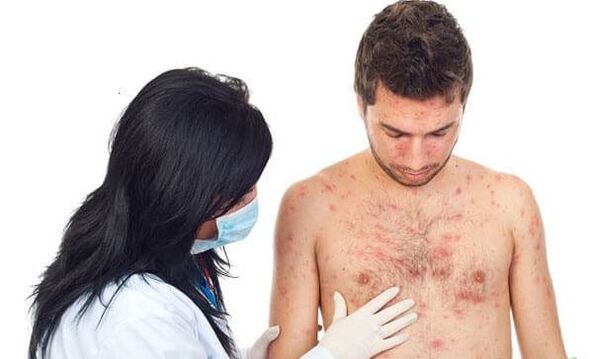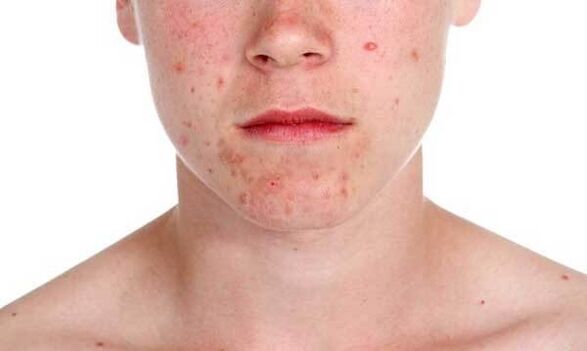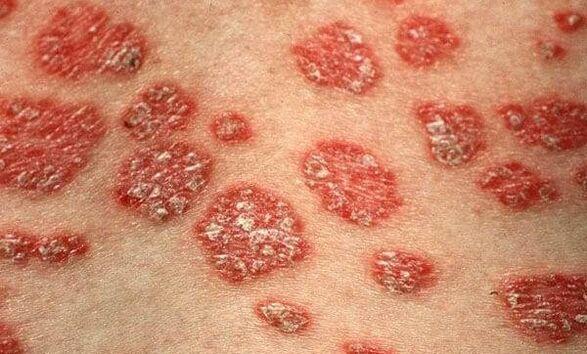Psoriasis (photos in the article) is a common chronic skin disease found in men, women and even children.It is very important to recognize the first signs of psoriasis.This will make an early diagnosis of the disease and take all the necessary measures to treat it.

How psoriasis begins and what kind of disease is
Psoriasis is an inflammatory skin disease, which is impossible to cure.Once the pathology faces, a person becomes a hostage throughout life.However, it can facilitate the manifestations of the disease.
To understand how psoriasis manifests, you should study in detail the stages of pathology development.The stages of psoriasis are the following:
- The papules in children and adults in the initial stage can be in one and plural.At first, these are barely notable rashes that do not bring discomfort.
- Very quickly, the manifestation of psoriasis acquires a more aggressive character, the spots become clearer, the scales of a silver or yellowish tone characteristic of them appear in them.
- The symptoms of skin psoriasis in posterior stages are the addition of an inflammatory process.Psoriasis in children and adults is accompanied by severe itching, a feeling of skin oppression, redness.

The stages of disease development and their duration differ depending on the individual characteristics of a person.Someone develops a pathology quickly, has pronounced symptoms, while other patients have single eruptions with a slight redness.
Answering the question of how to recognize psoriasis, you can distinguish three main characteristics:
- Clear eruption limits;
- the presence of peela;
- An increase in the number of scales when trying to scrape them.
Only a competent dermatologist is able to diagnose a pathology.Establishing a diagnosis independent and taking measures to treat it can be dangerous for your life.
Psoriasis symptoms depending on the type of pathology
Psoriasis has several types.Each of them has distinctive symptoms and severity.The types of diseases include:
- Ordinary (vulgar).
- Pustulenia
- Spot.
- In the form of a hole.
- Nail psoriasis.
Severe pathology forms include:
- Psoriatic arthritis.
- Erytroderma.

Depending on the location of eruptions in the body, they distinguish:
- Psoriasis in the body.
- In the scalp.
- Sustained of Ladomary.
- Knee.
- Psoriasis on the face.
- In the arms and legs.
In the severity of the disease course:
- Heavy.
- Light form
Spots arise in the body, face, legs and arms.Often, eruptions are located in the skin folds and place them more susceptible to friction.
- Antiallergic agents: allow it to eliminate itching, redness, edema.
- Hepatoprotectors: support the normal functioning of the liver.
- Enzymes: contribute to the development of the necessary enzymes.
- Non -steroidal anti -inflammatory medications: Eliminate the inflammatory process.
- Calmming: normalize the patient's psychosomatic state.
An important role in the treatment of the disease is performed by drugs that normalize immunity work.Immunomodulators for psoriasis.
All funds are used under the supervision of a doctor with a clear dose observance and a schedule.
Physiotherapy
Physiotherapy is an important method of treatment in the development of pathology.The following methods are used to get rid of stains:

- Ultrasound irradiation.
- Selective phytotherapy.
- PUVA - Therapy.
- Cryotherapy
- Magnetotherapy
- Laser treatment.
- Bathrooms with salt.
In addition, non -traditional methods such as Hirudotherapy (Sangujuela treatment), the use of fish and many others are often used.
Diet with psoriasis
The energy supply during the disease must be the maximum restriction of allergens, spicy foods, acids and salty.The patient must leave smoked meats, marinades, citrus.It must exclude chocolate, honey, eggs, nuts, red fruits.
Preference should be given to cereals, vegetable soups, low -fat dairy products, fish and low fat.You cannot drink alcohol and a large amount of caffeine.
The fulfillment of adequate nutrition, the implementation of all the instructions of the doctor and an attentive attitude towards his health will allow him to get rid of the disease and prevent his relapse for many years.























